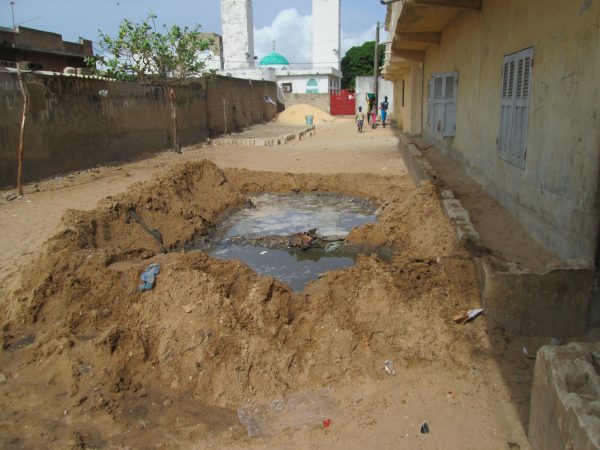
Septic trucks are available to empty pit latrines in parts of Dakar, Senegal, that are not connected to the downtown sewage system. However, many people can’t afford to pay for this service and do it by hand instead. Credit: Innovations for Poverty Action.
Maximizing the benefit of limited funds is critical for international development projects. Harnessing social interactions can help as they may spread desirable effects from individuals to the communities they live in.
Suppose a new fertilizer improves crop yield but is too expensive for most farmers. Providing small subsidies to ten farmers who attend the same church and will likely discuss the product’s merits may be more effective than giving larger subsidies to five farmers who are unlikely to interact. This social multiplier may reduce the product’s cost over time to further benefit the community.
Such positive spillover effects from targeted subsidies amplify a program’s direct effect—subsidized farmers are more likely to buy the fertilizer—by its indirect effect on unsubsidized farmers. AAE professor Laura Schechter and colleagues have studied spillover effects in a different context: urban sanitation in Dakar, the capital of Senegal on the West African coast.
“Many efforts to improve sanitation have focused on rural areas with mostly self-employed farmers whose main friends are their neighbors,” says Schechter. “But urban social networks are different, and the impact of those differences on sanitation choices has received less attention.”
Downtown Dakar has a modern sewage system, but its expansion is disruptive and prohibitively expensive. Almost two million peri-urban residents are not connected to that system and use pit latrines that need to be emptied, or desludged, about twice a year. Manual desludging is the most common option: Someone uses a shovel and bucket to dump the waste on the street in front of the house where it remains. The resulting long-term exposure to human excrement carries a high risk of diarrhea, a leading cause of childhood deaths in many developing countries.
The more desirable option is a septic truck service where a truck pumps the sludge out of the pit and takes it to one of three waste treatment centers. Only 44% of households in peri-urban Dakar who needed to empty their latrine in 2013 chose this option due to its higher cost.
To increase the use of these more sanitary services, Schechter and two colleagues received funding from the Bill and Melinda Gates Foundation in 2011. Their earlier analyses showed that traditional household subsidies were more effective than other incentive schemes and that privatizing waste treatment centers and having septic trucks bid on jobs also improved sanitation.
For the new study, Schechter teamed up with two AAE graduates—Joshua Deutschmann PhD’21 and Siyao (Jessica) Zhu PhD’19—and associate professor Molly Lipscomb (University of Virginia) to quantify spillover effects when some households received subsidies for using septic trucks and others did not. They also studied whether specific social mechanisms, such as learning from others or social pressure, influenced sanitation decisions.
The project’s enumerators interviewed 12 households in each of 410 “neighborhoods” (spatial clusters) in three waves between September 2013 and May 2015, for a total of 4,920 households. Ten randomly chosen “treatment households” in each cluster received high or low subsidies and two “spillover households” did not. This random assignment, known as a randomized controlled trial, is the gold standard in development economics as it minimizes the impact of other factors that influence household decisions.
The first survey introduced the study and collected demographic and social network data. For example, the enumerators asked households which of their 11 neighbors they drank tea with, an activity indicating stronger social connections. In the second survey, households could sign up for septic truck services. If they did, they received a sticker to place on their door that was visible to their neighbors. At the third visit, households were asked if they had used the service since the last visit and if they had noticed the stickers. The first and third survey also recorded recent diarrhea episodes for each household member.
The researchers estimated spillover effects by analyzing the sanitation decisions of households that received low or no subsidies. The social network data and other randomly assigned “mini-experiments” helped tease out whether these households were influenced by neighbors with whom they interacted regularly (learning from others) or whose opinions they cared about (social pressure).
The team found that an unsubsidized or low-subsidy household with three highly subsidized neighbors was equally likely to improve its own sanitation as a highly subsidized household, indicating a substantial spillover effect—but none of the tested social mechanisms explained it.

“Only the number of neighbors mattered but not their identities,” says Schechter. “The effect was the same whether the neighbors who signed up included someone’s best friend or only strangers they had never spoken with.” This suggests other reasons for behavioral change, such as a visible decrease in the amount of sludge on the street or seeing more septic trucks in the neighborhood, which makes it easier to contact them.
In addition to cleaner surroundings, fewer sick children may have also contributed to better sanitary decisions. Reported episodes of diarrhea decreased by 23% when a household’s four nearest neighbors used septic truck services.
“Spillover effects have mostly been attributed to social interactions, but we showed that they can be of similar magnitude for other reasons,” says Schechter, adding that future interventions should account for social differences between urban and rural settings. People in urban areas move more frequently, and their social networks may be based on work or church rather than residence. This is different from rural residents who may never leave the village they grew up in and know their neighbors very well.
The study has an important take-home message. “While strategies involving social pressure have helped improve rural sanitation, they may not work as well in urban areas,” says Schechter. “But we can still design targeted subsidies that also maximize spillover effects.”